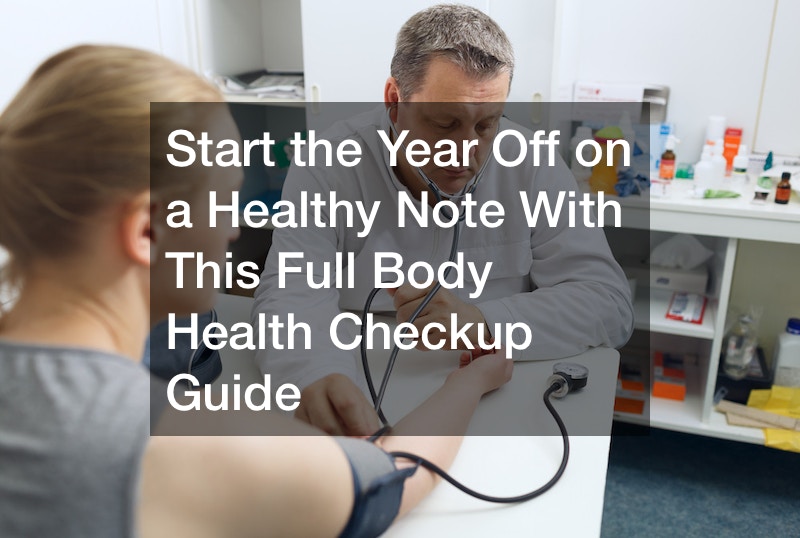
As we embark on a new year, there’s no better time to prioritize your well-being and set the stage for a healthier, happier you. To kickstart your journey toward optimal health, we present to you the ultimate guide for a full body health checkup. This comprehensive resource empowers you with the knowledge and tools needed to assess and enhance every aspect of your well-being. Whether you’re a health enthusiast looking to fine-tune your habits or someone seeking a fresh start on their wellness journey, this guide is your roadmap to cultivating a robust and resilient body that will carry you through the year ahead.
In this illuminating exploration, we’ll delve into the key components of a full body health checkup, ranging from cardiovascular and metabolic health to mental well-being. Uncover practical tips and expert insight into staying healthy. Let 2024 be the year you take charge of your health, armed with the knowledge to make informed decisions and build habits that will stand the test of time. It’s time to embrace a healthier lifestyle and embark on a more vibrant, energetic, and fulfilling journey.
Heart Health Checks
When ensuring the well-being of your heart, a full body health checkup plays an integral role in obtaining a thorough and accurate assessment. Regular visits to your healthcare provider allow for a more in-depth examination of your cardiovascular health. One of the primary tools in their arsenal is the electrocardiogram (ECG or EKG), a non-invasive test that records the electrical activity of your heart. This diagnostic tool can detect irregular heart rhythms, identify signs of ischemia, and provide crucial insights into your heart’s overall function.
In addition to ECGs, stress tests are valuable assessments that evaluate how your heart performs under physical exertion. By monitoring your heart’s response to increased activity, healthcare professionals can identify any abnormalities that may not be apparent during rest. These stress tests are especially beneficial for individuals with risk factors or symptoms related to cardiovascular issues. Furthermore, advanced imaging techniques such as echocardiograms or cardiac MRIs may be recommended to obtain a detailed visualization of your heart’s structure and function.
To ensure the heart is always in the best condition, maintaining a healthy body weight is essential. Many people with excess weight are advised to shed a few pounds to stay healthy. With a combination of exercise, diet, and other lifestyle changes, they can get back to their optimal body size and keep diseases away for longer. Those who struggle to do these tasks by themselves can seek help from medical weight loss clinics where professional assistance is offered specifically to help patients lose weight.
Lung Function Tests

Within the spectrum of a full body health checkup, evaluating lung function is paramount to ensuring overall respiratory health. These tests offer insights into the efficiency and capacity of your respiratory system, which is crucial for identifying potential issues and optimizing pulmonary function. Spirometry, a common lung function test, measures how much air you can inhale and exhale and at what rate, providing valuable data about the health of your lungs.
As part of a comprehensive health checkup, your healthcare provider may also assess your oxygen saturation levels using pulse oximetry. This non-invasive test gauges the amount of oxygen circulating in your blood, offering insights into how effectively your lungs transfer oxygen to your bloodstream. Abnormalities in oxygen saturation can indicate respiratory problems, prompting further investigation and targeted interventions.
For a more detailed examination of lung health, imaging studies such as chest X-rays or CT scans may be recommended during a health checkup. These diagnostic tools can detect conditions like pneumonia, lung cancer, or pulmonary fibrosis, allowing for early intervention and management. A cardiopulmonary rehab center can help by offering education, exercises, and support to strengthen heart and lung functions. With this, individuals can take proactive measures to maintain respiratory well-being and enjoy optimal overall health.
Cancer Screening
A comprehensive full body health checkup is pivotal in the early detection and prevention of various cancers, emphasizing the importance of routine cancer screening. These screenings typically involve a battery of tests tailored to assess the risk and presence of specific cancers, allowing for timely interventions and improved outcomes. Mammograms, for instance, are fundamental for breast cancer screening, aiding in the detection of abnormalities in breast tissue before symptoms arise. A colonoscopy service can also detect tumors and cancer inside the rectum and colon. Regular screenings are particularly vital for individuals with a family history of breast cancer or those deemed at higher risk.
Furthermore, screenings such as Pap smears and HPV tests are instrumental in identifying early signs of cervical cancer in women. By monitoring changes in cervical cells, these tests enable healthcare providers to intervene at a precancerous stage, significantly reducing the risk of progression to cervical cancer. Prostate-specific antigen (PSA) blood tests for men and colonoscopies for both genders are essential components of cancer screenings, targeting prostate and colorectal cancers, respectively. These screenings contribute to the early detection and effective management of these prevalent cancers, promoting overall health and longevity.
In the context of a full body health checkup, the integration of cancer screenings ensures a proactive and preventive approach to healthcare. Regular screenings empower individuals to make informed decisions about their health, facilitating early detection and prompt treatment when needed. By incorporating these screenings into a comprehensive health assessment, individuals can take proactive steps toward reducing the impact of cancer and promoting a healthier, cancer-resistant lifestyle.
Hormone Imbalance and Hormone Level Testing

Another crucial aspect of a full body health checkup involves assessing hormone levels to identify and address potential imbalances. Hormones help regulate various bodily functions, influencing metabolism, mood, and reproductive health. Hormone-level testing, such as thyroid function tests, can uncover imbalances that may contribute to issues like fatigue, weight gain, or mood changes. Regular monitoring of thyroid hormones, including TSH, T3, and T4, is essential for maintaining overall metabolic health.
In addition to thyroid function, full-body health checkups often include evaluations of sex hormones, such as estrogen and testosterone. Imbalances in these hormones can impact reproductive health, mood stability, and overall well-being. For individuals experiencing symptoms like irregular menstrual cycles, low libido, or mood swings, hormone level testing provides valuable insights that guide personalized interventions and treatment plans. There are also individuals undergoing natural hormone replacement therapy, which requires more frequent checkups to ensure steady progress.
Furthermore, adrenal function is another critical component often assessed in comprehensive health checkups. The adrenal glands produce hormones like cortisol, influencing stress response and energy levels. Chronic stress can lead to adrenal fatigue or dysfunction, impacting overall health. By addressing hormone imbalances through regular testing, individuals can take proactive steps toward achieving hormonal harmony and maintaining a healthy and balanced lifestyle.
Diagnostic Tests for Chronic Pain Conditions
A full body health checkup is crucial in identifying and understanding chronic pain conditions, providing a comprehensive approach to managing discomfort and improving overall well-being. Diagnostic tests for chronic pain aim to uncover the underlying causes of persistent discomfort, enabling healthcare providers to tailor effective treatment plans. Imaging studies, such as MRIs or CT scans, are instrumental in visualizing the structures of bones, joints, and soft tissues, helping identify conditions like arthritis, herniated discs, or nerve compression that may contribute to chronic pain.
In addition to imaging, blood tests can be valuable diagnostic tools for chronic pain conditions. Inflammatory markers, such as C-reactive protein (CRP) and erythrocyte sedimentation rate (ESR), can indicate the presence of inflammation in the body. Elevated levels of these markers may suggest conditions like rheumatoid arthritis or autoimmune disorders contributing to chronic pain. Comprehensive blood panels may also assess vitamin and mineral levels, providing insights into nutritional deficiencies that can impact musculoskeletal health and contribute to persistent pain.
Functional and biomechanical assessments are another facet of full-body health checkups for chronic pain. These evaluations may include tests to assess joint mobility, muscle strength, and posture. Some people can benefit from professional chiropractor services where the body is assisted through various stretches and exercises to encourage self-healing. They offer chiropractic adjustment treatment to ensure the spine is aligned well, which further promotes healing. By integrating these diagnostic tests and treatments into a holistic health assessment, individuals can embark on a personalized journey toward managing chronic pain and improving their overall quality of life.
Mental Health Assessment

A full body health checkup extends beyond the physical realm to encompass a vital component—mental health. A comprehensive mental health assessment is an integral part of these checkups, acknowledging the interconnectedness of mental and physical well-being. Various standardized tools and interviews are employed to evaluate aspects such as mood, anxiety levels, cognitive function, and overall psychological well-being. By incorporating mental health assessments into routine checkups, healthcare providers can identify potential concerns early on, paving the way for timely intervention and support.
Behavioral support services are key elements that often follow mental health assessments within full-body health checkups. For individuals grappling with stress, anxiety, or depression, behavioral interventions can be instrumental in fostering positive coping mechanisms and resilience. Therapeutic modalities such as cognitive-behavioral therapy (CBT) or mindfulness-based approaches may be recommended based on individual needs. Behavioral support extends beyond traditional therapeutic avenues, encompassing lifestyle modifications, stress management techniques, and fostering healthy relationships—all crucial components of a holistic approach to mental health.
Incorporating mental health assessments and behavioral support into full-body health checkups underscores the importance of addressing mental well-being as an integral part of overall health. By recognizing and addressing mental health concerns in tandem with physical health, individuals can embark on a comprehensive journey toward optimal well-being, enhancing not only their mental resilience but also their overall quality of life.
Nutrient and Vitamin Deficiency Tests
Assessments for nutrient and vitamin deficiencies are included in a full body health checkup, which recognizes the profound impact these deficiencies can have on overall health. Blood tests measuring essential vitamins and minerals levels provide valuable insights into potential deficiencies that may affect various bodily functions. For instance, low levels of vitamin D, B vitamins, or iron can lead to various health issues, including fatigue, weakened immune function, and impaired cognitive performance. Identifying and addressing these deficiencies through targeted testing is crucial for optimizing overall health.
In response to identified deficiencies, healthcare providers may recommend interventions like intravenous (IV) therapy as part of the full-body health checkup. IV therapy services deliver essential nutrients directly into the bloodstream, bypassing the digestive system and allowing for rapid absorption. This method is particularly beneficial for individuals with severe nutrient deficiencies or those who may have difficulty absorbing nutrients through the digestive tract. IV therapy can be customized based on specific nutrient needs, providing a tailored approach to replenishing deficiencies and promoting optimal health.
Moreover, IV therapy is gaining popularity beyond treating deficiencies, with wellness clinics offering customized IV infusions to enhance overall well-being. These infusions may include a combination of vitamins, minerals, antioxidants, and hydration, providing a holistic approach to supporting bodily functions and promoting vitality. As a complementary element to full-body health checkups, nutrient and vitamin deficiency tests coupled with IV therapy offer a proactive strategy to address nutritional imbalances and boost overall health.
Dental Visits

While often overlooked in discussions about health checkups, regular dental visits play a crucial role in maintaining overall health. Oral health is intricately connected to systemic well-being, with dental issues potentially impacting various aspects of health. During a comprehensive health checkup, your local dentist will assess the condition of your teeth and gums, looking for signs of decay, gum disease, or other oral health concerns. Early detection and intervention can prevent these issues from escalating and affecting not only oral health but also contributing to systemic health problems.
Beyond the immediate impact on oral health, dental visits are vital for preventing conditions with broader health implications. Regular dental checkups can aid in identifying and managing gum disease, reducing the risk of complications that may extend beyond the oral cavity. Moreover, a healthy mouth contributes to better nutrition, as maintaining proper dental function allows individuals to chew and digest a well-balanced diet comfortably. General dentistry will always ensure that the mouth is in good health, which, in turn, prevents other bodily illnesses.
In the context of a full body health checkup, dental visits ensure a holistic approach to well-being. Integrating oral health assessments with other health evaluations provides a comprehensive understanding of an individual’s overall health status. By recognizing the interconnectedness of oral health and systemic health, individuals can take proactive steps to maintain a healthy mouth and body, promoting longevity and a higher quality of life.
Embracing a holistic approach to health through a comprehensive full body health checkup is paramount for cultivating overall well-being. From cardiovascular assessments and cancer screenings to mental health evaluations and dental visits, these checkups thoroughly examine physical and mental aspects, identifying potential issues before they escalate. By recognizing the interconnectedness of various health components, individuals can embark on a personalized journey toward optimal health, fostering resilience, longevity, and a balanced lifestyle.






